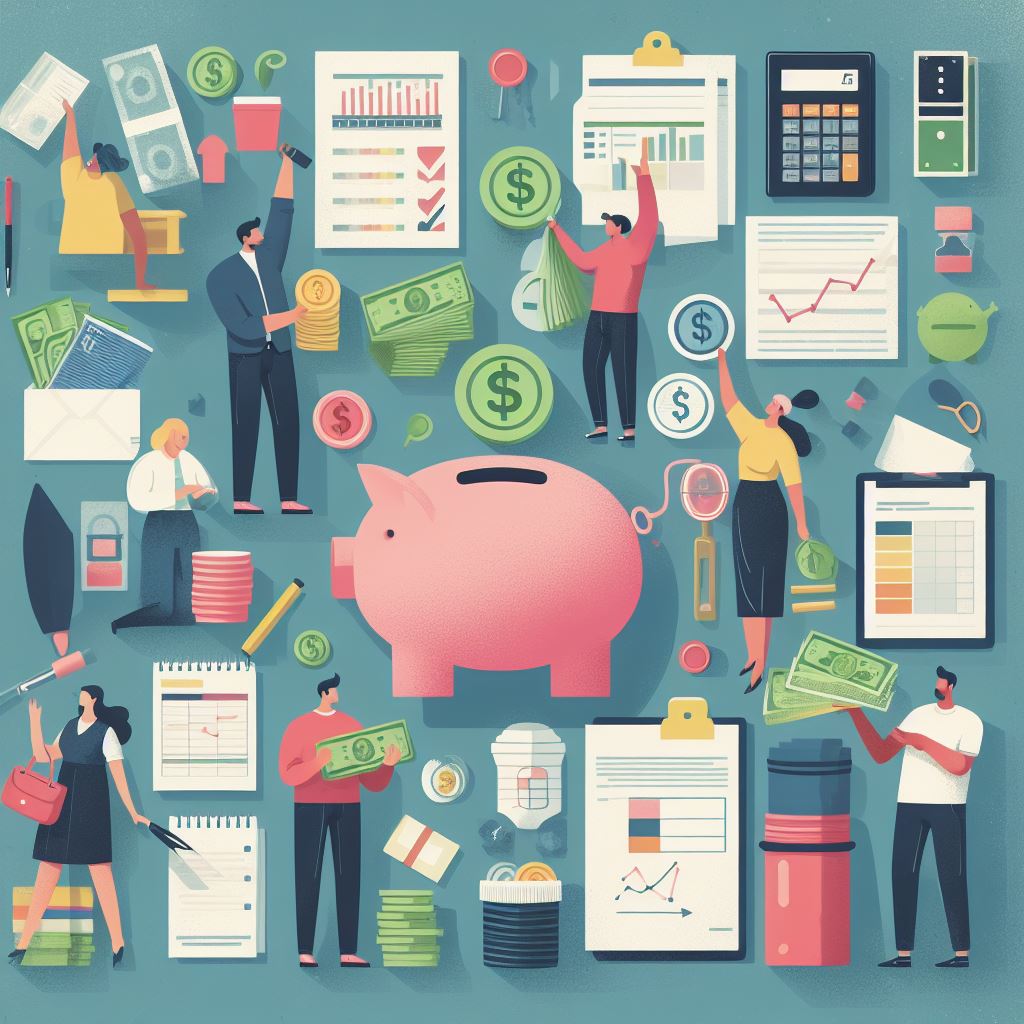Seven Budgeting Strategies for Stamp Recipients

Are you struggling to make ends meet as a stamp recipient?
Don’t worry, we’ve got you covered with seven budgeting strategies that will help you get back on track.
From tracking and analyzing your spending to prioritizing essential expenses, these practical tips will empower you to take control of your finances.
With a little planning and preparation, you can stretch your budget further than you ever thought possible.
So, are you ready to start saving? Let’s dive in!
Key Takeaways
- Keep track of expenses and categorize them to identify overspending areas
- Prioritize essential expenses such as housing, utilities, and food
- Reduce non-essential costs by evaluating subscriptions, cooking at home, and finding free or low-cost activities
- Take advantage of discounts and coupons to save on shopping expenses
Track and Analyze Your Spending
To effectively manage your budget as a stamp recipient, you need to track and analyze your spending in order to make informed financial decisions. Tracking your spending allows you to see where your money is going and identify areas where you may be overspending.
Start by creating a budget spreadsheet or using a budgeting app to record all your expenses, including the amount, date, and category. Categorize your expenses into different groups, such as groceries, transportation, and entertainment, to get a clear picture of your spending patterns.
Once you have tracked your spending for a month or two, it’s time to analyze the data. Look for any trends or patterns in your spending habits. Are there any categories where you consistently overspend? Are there any areas where you can cut back? By identifying these patterns, you can make adjustments to your budget and prioritize your spending accordingly.
Analyzing your spending also helps you set realistic financial goals. If you want to save for a specific purpose, like a vacation or emergency fund, you can allocate a certain amount each month towards that goal.
Prioritize Essential Expenses
Now that you have tracked and analyzed your spending, it’s time to prioritize your essential expenses as a stamp recipient. Prioritizing your expenses is crucial to ensure that you meet your basic needs and make the most out of your limited budget. Here are some practical strategies to help you prioritize your essential expenses.
First, focus on your basic needs such as housing, utilities, and food. These are the expenses that are necessary for your survival, so make sure they’re covered before anything else. Consider finding ways to reduce these costs, such as finding cheaper housing options or cooking meals at home instead of eating out.
Next, prioritize your healthcare expenses. This includes things like health insurance premiums, medications, and doctor’s visits. Staying healthy is essential, so make sure you allocate enough funds to cover these expenses.
After taking care of your basic needs and healthcare, consider other essential expenses such as transportation, education, and debt payments. Evaluate each expense and decide which ones are necessary for your well-being and financial stability.
Remember, the key is to be realistic and practical when prioritizing your expenses. Cut back on non-essential items and focus on what’s truly important for your daily life and future goals.
Find Ways to Reduce Non-Essential Costs
Cutting back on non-essential costs is key to maximizing your budget as a stamp recipient. By identifying and reducing these expenses, you can free up more funds for your essential needs. Here are some practical strategies to help you reduce non-essential costs:
- Evaluate your subscriptions: Take a close look at your monthly subscriptions and eliminate any that you no longer use or need. Consider switching to less expensive alternatives or sharing subscriptions with family or friends.
- Cook at home: Eating out can quickly add up. Instead, plan your meals and cook at home. This not only saves money but also allows you to have more control over your diet and nutrition.
| Non-Essential Cost | Savings Strategy |
|---|---|
| Dining out | Cook at home |
| Entertainment | Utilize free activities and events |
- Reduce entertainment expenses: Look for free or low-cost activities in your community, such as local parks, libraries, and community centers. Take advantage of free events, explore nature trails, or borrow books and movies from the library.
- Cut back on unnecessary shopping: Before making a purchase, ask yourself if it is truly necessary. Avoid impulse buying and consider shopping second-hand or borrowing items from friends or family.
Take Advantage of Discounts and Coupons
Maximize your savings as a stamp recipient by utilizing discounts and coupons. Taking advantage of discounts and coupons is a smart way to stretch your budget and save money on your everyday expenses. Here are some practical tips to help you make the most of these savings opportunities.
First, always be on the lookout for discounts and coupons. Check newspapers, magazines, and online coupon websites for deals on items you regularly purchase. Sign up for email newsletters from your favorite stores to receive exclusive discounts and promotions.
Second, plan your shopping trips around the discounts and coupons available. Make a list of the items you need and check if there are any discounts or coupons available for those specific products. This way, you can maximize your savings by using coupons on items that are already on sale.
Third, be mindful of expiration dates. Many discounts and coupons have expiration dates, so make sure to use them before they expire. Keep track of the expiration dates and organize your coupons accordingly to avoid missing out on savings.
Lastly, consider joining loyalty programs or rewards programs offered by stores. These programs often provide additional discounts and exclusive offers to members, allowing you to save even more on your purchases.
Plan and Prepare Meals on a Budget
Save money on your meals by creating a budget-friendly meal plan. Planning and preparing meals on a budget can help you save money and make the most of your food stamp benefits. Here are some practical strategies to help you stretch your food dollars and eat well.
First, start by planning your meals for the week. Take a look at what ingredients you already have and plan your meals around them. This will help you avoid buying unnecessary items and reduce food waste.
Next, make a shopping list and stick to it. Having a list will help you stay focused and avoid impulse purchases. Look for sales and discounts on staple items and try to buy in bulk when possible.
Consider buying generic or store-brand items instead of name brands. They’re often just as good but cost less.
When you get home from the store, take some time to prep your ingredients. Wash and chop vegetables, cook grains and proteins in advance, and portion out meals for the week. This will save you time and make it easier to cook during busy weekdays.
Lastly, try to cook large batches of meals and freeze leftovers for later. This way, you can always have a home-cooked meal ready to go when you don’t have time or energy to cook from scratch.
Frequently Asked Questions
How Can I Effectively Track My Spending Without Using Any Budgeting Tools or Apps?
You can effectively track your spending without using any budgeting tools or apps by using a simple pen and paper. Write down all your expenses and review them regularly to stay on track with your budget.
Are There Any Strategies to Prioritize Essential Expenses for Stamp Recipients Who Have Fluctuating Income?
To prioritize essential expenses with fluctuating income, assess your needs and wants. Imagine you have a limited amount of stamps for the month – would you use them on necessities or luxuries? Make smart choices.
What Are Some Creative Ways to Reduce Non-Essential Costs Without Compromising on Quality of Life?
To reduce non-essential costs without compromising your quality of life, try these creative strategies. Cut unnecessary subscriptions, shop for deals, cook meals at home, buy second-hand, and DIY.
How Can Stamp Recipients Find Discounts and Coupons Specifically Catered to Their Needs?
You can find discounts and coupons specifically catered to your needs as a stamp recipient by checking online coupon websites, signing up for store loyalty programs, and subscribing to newsletters from your favorite brands.
Are There Any Tips for Planning and Preparing Meals on a Budget That Take Into Account Dietary Restrictions or Allergies?
Are you looking for tips on planning and preparing budget-friendly meals that accommodate your dietary restrictions or allergies? Here’s some advice to help you save money while still enjoying delicious and safe meals.



